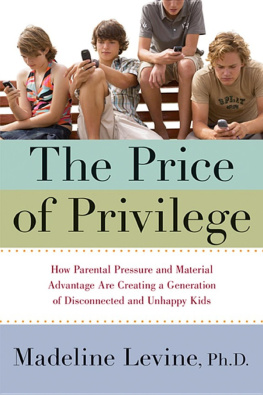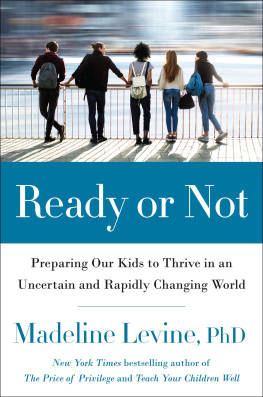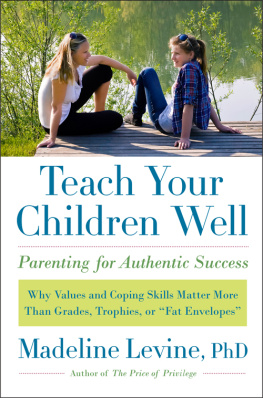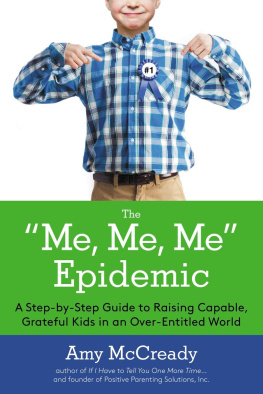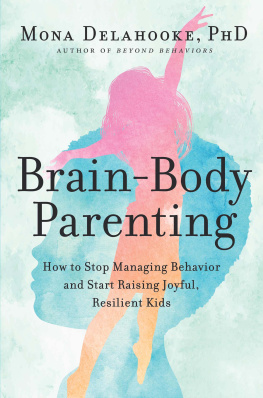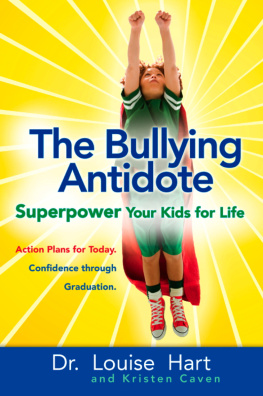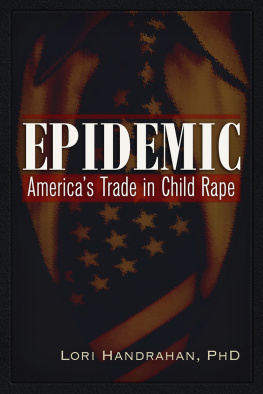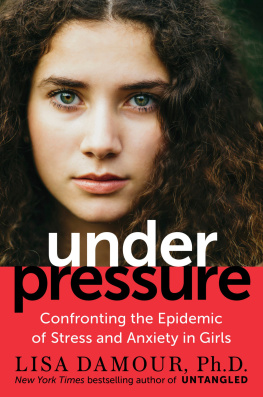This book is dedicated to the four amazing men in my life.
To my husband, Lee, for his good-humored love,
support, and encouragement. And to our three sons,
Loren, Michael, and Jeremy who inspire me daily and
whom I love beyond words and reason.
CONTENTS
P ART O NE
AMERICAS NEW AT-RISK CHILD
CHAPTER ONE
The Paradox of Privilege
CHAPTER TWO
The Not-So-Hidden Mental Health Epidemic Among Privileged Youth
CHAPTER THREE
Why Money Doesnt Buy Mental Health
P ART T WO
HOW THE CULTURE OF AFFLUENCE WORKS AGAINST THE DEVELOPMENT OF THE SELF
CHAPTER FOUR
What Is a Healthy Self?
CHAPTER FIVE
Different Ages, Different Parenting Strategies
P ART T HREE
PARENTING FOR AUTONOMY
CHAPTER SIX
How We Connect Makes All the Difference
CHAPTER SEVEN
Discipline and Control: The Tough Job of Being the Bad Cop
P ART F OUR
WHY YOU HAVE TO STAND ON YOUR OWN TWO FEET BEFORE YOUR CHILDREN CAN STAND ON THEIRS
CHAPTER EIGHT
Challenges to Effective Parenting in the Culture of Affluence
CHAPTER NINE
Having Everything Except What We Need Most: The Isolation of Affluent Moms
It was 6:15 P.M . Friday when I closed the door behind my last unhappy teenage patient of the week. I slumped into my well-worn chair feeling depleted and surprisingly close to tears. The fifteen-year-old girl who had just left my office was bright, personable, highly pressured by her adoring, but frequently preoccupied, affluent parents, and very angry. She had used a razor to incise the word EMPTY on her left forearm, showing it to me when I commented on her typical cutter disguisea long-sleeve T-shirt pulled halfway over her hand, with an opening torn in the cuff for her thumb. Such T-shirts are almost always worn to camouflage an array of self-mutilating behaviors: cutting with sharp instruments, piercing with safety pins, or burning with matches. I tried to imagine how intensely unhappy my young patient must have felt to cut her distress into her flesh.
As a psychologist who has been treating unhappy teens for over twenty-five years, I wondered why this particular child left me feeling so ragged. I live and work in an upper-middle-class suburban community with concerned, educated, and involved parents who have exceedingly high expectations for their children. In spite of parental concern and economic advantage, many of my adolescent patients suffer from readily apparent emotional disorders: addictions, anxiety disorders, depression, eating disorders, and assorted self-destructive behaviors. Others are perplexingly and persistently unhappy in ways that are more difficult to quantify easily. The fact that many of these teens are highly proficient in some areas of their lives helps mask significant impairments in othersthe straight-A student who feels too socially awkward to attend a single school dance, the captain of the basketball team who is abusive toward his mother, the svelte homecoming queen who consistently sees a fat ugly duckling in the mirror. While I love my work, it is also quite demanding and I usually greet the end of the day on Friday with a mixture of relief and anticipation, not sadness. Sinking further into my chair, I flipped through my appointment book, searching for clues to my emotional weariness.
I was not surprised by the seriousness of many of my cases. After two decades of treating unhappy kids, and the publication of a couple of books on how the media influence child development, I had become a senior psychologist and am often referred difficult cases. I enjoy working with troubled adolescents and seem to have a knack for developing an easy rapport with them. The eating-disordered girls who are enraged by their mothers submissiveness and yet mimic it in their own self-defeating behavior. The junior high school girls with pitiable self-esteem who regularly give oral sex to boys behind the school gymnasium, while insisting that they are not sexually activean astonishing redefinition of sexual activity shared by most of their generation. The substance-abusing boys who attempt to ward off depression with drug use but ultimately end up in out-of-the-way places for a year or two of rehab. Many of these teenagers suffer from obvious emotional illnesses: depression, anxiety disorders, eating disorders, and substance abuse. Often there is a family history of depression or bipolar illness or alcoholism. These teens look troubled. Their grades are usually poor, their relationships volatile, and their behavior floridly risky. Their parents are terrified when they haul them in for treatment.
But I was puzzled by the fact that an increasingly large number of my hours were filled with cases that initially seem to be rather garden-variety adolescent problems. When parents make calls to my office for these kids, there is often little sense of urgency. Some parents may have a vague sense that all is not well and ask me to take a look at their child. A few have discovered drug paraphernalia or perhaps an unsettling diary entry and call, hoping I will allay their fears since these same teens are doing well in school and are compliant at home. They may note that their child appears less sunny, or seems somewhat withdrawn, but these parents dont see their children as troubledunhappy maybe, but not troubled. More than a few parents call not out of their own concern, but at the insistence of their teenager.
In fact, many of these teens have a notable ability to put up a good front. Absent the usual list of suspectsbad divorces, substance abuse, immobilizing depression, school failure, or delinquent behaviortheir parents are frequently surprised by their request to see a therapist. It would be a stretch to diagnose these kids as emotionally ill. They dont have the frazzled, disheveled look of kids who know they are in serious trouble.
Nevertheless, they complain bitterly of being too pressured, misunderstood, anxious, angry, sad, and empty. While at first they may not appear to meet strict criteria for a clinical diagnosis, they are certainly unhappy. Most of these adolescents have great difficulty articulating the cause of their distress. There is a vagueness, both to their complaints and to the way they present themselves. They describe being at loose ends or missing something inside or feeling unhappy for no reason. While they are aware that they lead lives of privilege, they take little pleasure from their fortunate circumstances. They lack the enthusiasm typically seen in young people.
After a few sessions, sometimes more, the extent of distress among these teenagers becomes apparent. Scratch the surface, and many of them are, in fact, depressed, anxious, and angry. Quite a few have been able to hide self-injurious behaviors like cutting, illegal drug use, or bulimia from both their parents and their peers. While many of these teens are verbal and psychologically aware, they dont seem to know themselves very well. They lack practical skills for navigating out in the world; they can be easily frustrated or impulsive; and they have trouble anticipating the consequences of their actions. They are overly dependent on the opinions of parents, teachers, coaches, and peers and frequently rely on others, not only to pave the way on difficult tasks but to grease the wheels of everyday life as well. While often personable and academically successful, they arent particularly creative or interesting. They complain about being bored; they are often boring.

